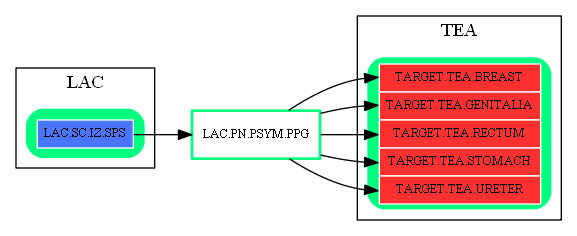BrainRegionLAC PN PSYM PPG
From aHuman Wiki
Revision as of 08:57, 30 July 2015 by Admin (Talk | contribs) (Automated page entry using MWPush.pl)
Pelvic Peripheral Ganglion
@@Home -> BiologicalLifeResearch -> BrainAreaLAC -> BrainRegionLAC_PN_PSYM_PPG
This page covers biological details of component Pelvic Peripheral Ganglion. Region is part of aHuman target integrated biological model.
- Top-down path to region: Peripheral Nervous System -> Parasympathetic Ganglia (PNS.PSYM) -> Body Parasympathetic Ganglia (PN.PSYM.BD) -> Pelvic Peripheral Ganglion (LAC.PN.PSYM.PPG) (see Mind Maps)
- Type: parasympathetic ganglion
- Brain area: Lower Brain - Autonomous Control Area
- Role: parasympathetic
- Function: Sigmoid, rectum, bladder, and external genitalia
- Notes to function: Pelvic nerve fibers
(generated)
Components
(generated)
- no child items defined
Connectivity
(generated)

Inbound Region Connections:
| Source Area | Source Region | Source Name | Type | Reference |
| LAC | LAC.SC.IZ.SPS | Sacral Parasympathetic Nucleus | excitatory-glu | Schematic overview of spinobulbospinal micturition reflex pathway (SPS -> PEL) |
Outbound Region Connections:
| Target Area | Target Region | Target Name | Type | Reference |
| TEA | TARGET.TEA.BREAST | Breast | nipple-smooth-muscles | (unknown reference) |
| TARGET.TEA.GENITALIA | Genitalia | corpus-cavernosum-clitoridis | (unknown reference) | |
| TARGET.TEA.RECTUM | Rectum | sphincter-ani-internus-muscle-parasympathetic | (unknown reference) | |
| TARGET.TEA.STOMACH | Stomach | stomach-wall | (unknown reference) | |
| TARGET.TEA.URETER | Ureter | detrusor-urinae-muscle-parasympathetic | (unknown reference) |
Thirdparty Circuits
(generated)

- Face glands - see Reference


References
(generated)
- http://www.intechopen.com/books/computational-intelligence-in-electromyography-analysis-a-perspective-on-current-applications-and-future-challenges/sphincter-emg-for-diagnosing-multiple-system-atrophy-and-related-disorders
- http://www.studyblue.com/notes/note/n/neuroanatomy-lecture-14-/deck/4433536
- http://jp.physoc.org/content/557/1/287/F9.expansion.html